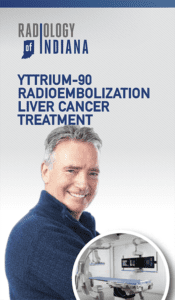Better
Options
Faster
Results
A Scientifically-Based Palliative Alternative to Radio and Chemotherapies
For patients with a primary or metastatic liver cancer diagnosis, the treatment road ahead can be both long and arduous. Unfortunately, about 18,500 cases of liver cancer are diagnosed each year. It is twice as common in men than women and frequently is seen in patients with cirrhosis.
Treatment is often made difficult because liver tumors are often inoperable and chemotherapy drugs have been ineffective in curing liver cancer. But there’s some good news, in the form of new image-guided treatment options at Radiology of Indiana that can extend and improve the quality of life.
What Is Y90, Or Radioembolization?
The procedure delivers powerful doses of radiation exactly where it’s needed, and just as important, avoids exposing radiation in areas where it’s not needed. A highly trained physician–like the interventional radiologists at Radiology of Indiana–uses advanced x-ray technology to guide small doses of radiation by precisely guiding an injection through blood vessels to the affected area. The injection contains microscopic glass beads that carry radiation to the cancer cells in the liver, cutting off their supply of blood and oxygen, preventing them from growing.
Y90 is not a cure, but it can significantly slow the growth of the disease and provide relief of some symptoms.
Meet Our Certified MD Anderson Cancer Network® Physicians
Radiology of Indiana has five physicians that are certified by the MD Anderson Cancer Network®.
“The MD Anderson Physicians Network® is a quality management and best practices organization that delivers cancer management services through the MD Anderson Certified Member® program. Our goal is to improve cancer care in the general community by providing world-class, MD Anderson-branded oncology services to local hospitals in the United States. Our multidisciplinary network of providers is committed to delivering the most appropriate cancer treatment using the MD Anderson Cancer Center clinical guidelines, which includes an integrated approach to education, prevention, screening, diagnosis, treatment and follow-up care.”
–MD Anderson Cancer Center
We Work with Clinically Proven Treatments, Not Well Meaning Promises. Fortunately, Y90 Holds Out Genuine Promise to the Right Patients.
“One of the most common sources of metastatic disease to the liver comes from the colon and rectum. About 140,000 people are diagnosed with colon cancer in the U.S. per year and roughly half will develop tumors in the liver at some point.

“This technique spares other healthy tissue in the body.”
“Treatment with Y 90 Radioembolization can be used to treat both primary and metastatic disease in the liver. This is a minimally invasive procedure performed by specially trained Interventional radiologists that delivers radiation particles directly to the tumor through a small catheter placed in the blood supply to the tumor. This technique spares other healthy tissue in the body.”
Frequently Asked Questions
Can This Procedure Cure Liver Cancer?
The Y90 procedure is not a cure for cancer, but it can effectively treat the symptoms, prolong the life of the patient and improve quality of life. Work with your oncologist to see if the procedure is right for you.
What Are The Risks?
The risks associated with radioembolization are minimal, but it’s good to know them up front:
- As with any procedure that penetrates the skin, there is a minor risk of infection.
- As with any procedure that utilizes angiography, there is a slight risk of an an allergic reaction to the contrast material that’s used to perform it.
- In some rare cases, the microspheres used in the procedure may become misplaced and cause an ulcer. When this happens, these ulcers are nearly always treated the same day and the patient is still able to return home.










